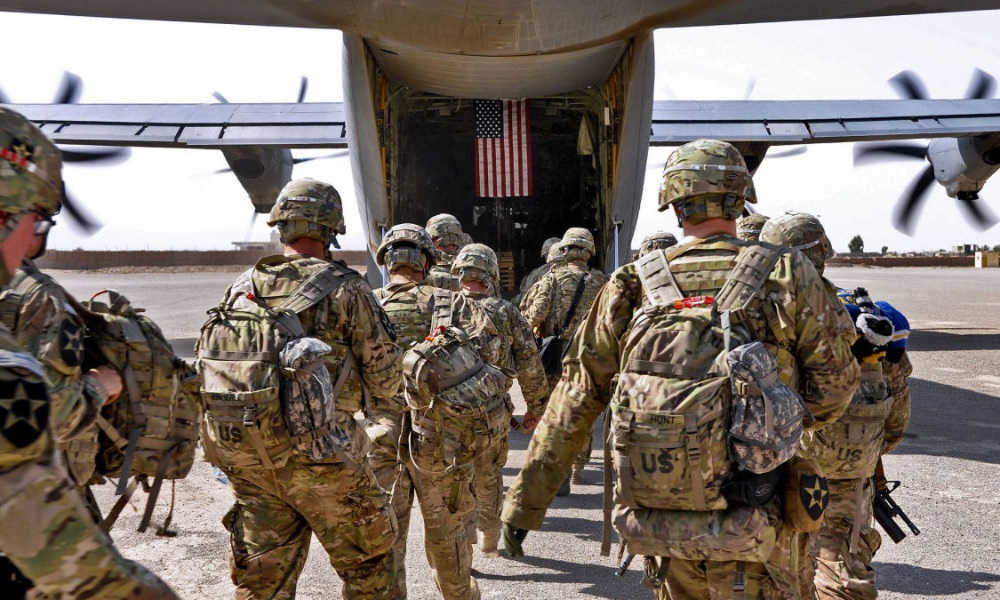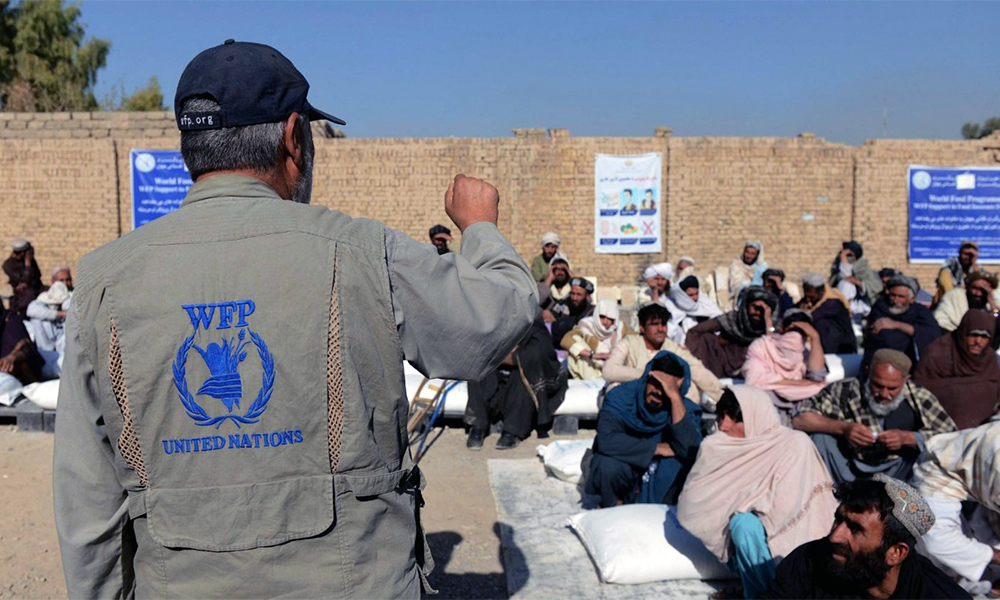Latest News
US completes as much as 25% of retrograde process in Afghanistan

The US Central Command (CENTCOM) said this week that it has “completed between 16-25 percent of the entire retrograde process.”
CENTCOM said in a statement United States Department of Defense has retrograded the equivalent of approximately 160 C-17 loads of material out of Afghanistan and has turned over more than 10,000 pieces of equipment to the Defense Logistics Agency for disposition.
The US has officially handed over five facilities to the Afghan Ministry of Defense, the statement said.
The CENTCOM did not elaborate on the installations.
“For operational security reasons we will only be providing an approximate range of the percentage of the exit process that is complete,” the statement noted.
“As the responsible and orderly exit continues, the size of the range will increase to preserve operational security. This update includes the progress on the retrograde of troops and equipment from Afghanistan, the turning over of equipment and facilities to the ANDSF, as well as the destruction of some equipment,” the statement concluded.
The foreign troops’ withdrawal process started officially early this month. According to US President Joe Biden’s decision, the withdrawal process will be complete by September 11 – the 20th anniversary of the 9/11 attack on the United States.
Meanwhile, Senator Minority Leader Mitch McConnell was on Tuesday critical of US President Joe Biden’s decision to withdraw U.S. forces in Afghanistan by September 11 and warned that this decision is not underpinned by a clear plan to mitigate the risks once troops have withdrawn.
Addressing the U.S. Senate, McConnell said Biden’s decision was “dangerous, wishful thinking”.
He said the decision “is not underpinned by a coherent plan to mitigate the geopolitical and humanitarian risk that our departure will create.”
“When we are gone, after we leave, there’s every reason to believe al-Qaeda will regroup in its historic safe haven.
“Giving up the high ground while the enemy is still on the battlefield is not a strategic move. Neither is banking on conducting so-called over the horizon counterterrorism missions without presence on the ground,” he said.
McConnell said the U.S. had learned that in order to fight terrorists, it was important to have reliable access and local partnerships.
He said the U.S. military currently flies both reconnaissance and strike missions against terrorists from within Afghanistan – adding that the country is not easy to get to as the neighboring countries are Iran, Pakistan and Russian-influenced Central Asian nations.
“They aren’t exactly likely to let the U.S. base significant counterterrorism units in their country. So where will we be basing these forces? How will we maintain sorties from thousands of miles away?,” he asked.
He also said: “How many forces will be required to secure our embassy if a pro-Taliban mob threatens to overrun it. What will we do to protect it? Where will a quick reaction force be based if not in Afghanistan?”
McConnell said Washington had learned about the “tyranny of distance” from the 2012 Benghazi attack against two United States government facilities in Libya , which claimed the lives of the U.S. ambassador to Libya and another diplomat.
“If the Taliban takes Kabul, will the Biden administration recognize it as the legitimate government of Afghanistan?,” he asked, adding “will we shutter our embassy and our aid programs?”
The reality, he said, was “they don’t know. They can’t say. There’s no plan.”
He went on to state that the U.S. was in fact “abandoning” Afghanistan.
“It’s not courageous to abandon our allies,” he said.
“The horrific, horrific reports of the Taliban beginning to reimpose their version of Sharia Law are just a taste of the catastrophes facing our friends in Afghanistan who have borne the brunt of the fight.
“Human rights, women’s rights, counterterrorism, refugee flows – as far as I can tell, the administration has no plan,” he said.
He stated the world “will see it for what it is – retreating from the fight; abandoning our partners.
“This is the president’s decision. He chose a precipitous withdrawal from Afghanistan. Unbelievably, he even chose the anniversary of September 11 as the deadline.”
In conclusion, McConnell said he hopes once Biden’s team has confronted the president with the risks, he hopes “the president will think again and reconsider”.
Latest News
Afghan delegation to participate in Iran’s international expo

Iranian officials have announced that a 200-member delegation, comprising Afghan government officials and private sector representatives, will attend the 7th International Exhibition of Iran’s Export Capabilities.
Officials from the Islamic Emirate, meanwhile, consider the presence of Afghan traders at this exhibition to be significant, stating that showcasing domestic products will help promote and market Afghan goods.
Abdul Latif Nazari, Deputy Minister of Economy, said: “Economic cooperation between the private and public sectors of Afghanistan and Iran is in the interest of both countries.”
“The visit of the high-ranking delegation of the Islamic Emirate to Iran can play a vital role in expanding economic and trade exchanges between the two countries,” he added.
In addition, Afghanistan Chamber of Commerce and Investment (ACCI) said that 80 booths have been allocated to Afghan traders at the exhibition, where agricultural products, precious stones, and other Afghan goods will be showcased.
Several experts also stated that Afghanistan’s participation in regional and international exhibitions is important and can lead to stronger economic ties with other countries.
This comes as Iran remains one of Afghanistan’s key economic partners, with annual trade volume between the two nations exceeding $3 billion.
Latest News
14 kms of TAPI pipeline laid inside Afghanistan, says project manager

Baganch Abdullayev, the General Director of the TAPI project in Afghanistan, on Thursday met with Noor Ahmad Islamjar, the governor of Herat, for a report back on progress made in accelerating the pipeline-laying process of the Turkmenistan-Afghanistan-Pakistan-India project in the province.
The Herat governor’s press office said in a statement that Abdullayev shared a brief report on the progress of the TAPI project with Islamjar.
According to the statement, Abdullayev said so far 14 kms of pipeline has been laid while an additional 24 kms of ground has been levelled for the pipeline.
During the meeting, the governor of Herat also welcomed the efforts of TAPI project officials in advancing the work and assured the project head of the local administration’s full support in facilitating the swift progress of the project.
Once completed, TAPI pipeline will transport natural gas from the Galkynysh Gas Field in Turkmenistan through Afghanistan into Pakistan and then to India.
The pipeline was completed on the Turkmenistan side in 2024, and the project is currently expanding southbound in Herat Province of Afghanistan.
Latest News
WFP appeals for $25 million to help support Afghan returnees amid humanitarian crisis

The World Food Programme (WFP) this week issued an urgent appeal for $25 million to address the escalating needs of Afghan refugees being expelled from Pakistan.
According to the WFP, thousands of Afghan families are crossing into Afghanistan from Pakistan every day and face serious food insecurity.
The organization also stated that millions in Afghanistan are grappling with severe hunger, and immediate aid of $25 million is needed to assist returnees.
On Wednesday, April 23, in a video shared on X, WFP’s head in Afghanistan, Mutinta Chimuka, visited the Torkham border crossing with Pakistan. During her visit, she highlighted the challenges faced by returnees, many of whom have spent their entire lives in Pakistan and are unfamiliar with Afghanistan.
Chimuka pointed out that many returnees have no income, employment, food, or shelter.
The WFP stressed that thousands of families are being forced to leave Pakistan, while 15 million people in Afghanistan are uncertain where their next meal will come from. The situation has become dire, with basic needs going unmet for a large portion of the population, the WFP said.
Chimuka warned that current aid efforts are insufficient to support the returnees, and new financial resources are urgently needed to address their needs by the end of the year.
Meanwhile, the pace of deportations and expulsions of Afghan migrants from neighboring countries, particularly Pakistan, continues to increase. The Pakistani Ministry of Interior reported that over 100,000 Afghan migrants have been returned since April 1.
The International Committee of the Red Cross (ICRC) has also raised alarm, noting that while thousands of refugees return every week, there are millions of Afghans who are currently facing poverty, homelessness, and difficult living conditions.
-

 World5 days ago
World5 days agoThousands of protesters rally against Trump across US
-

 Latest News5 days ago
Latest News5 days agoPolio vaccination campaign launched in Afghanistan
-

 International Sports3 days ago
International Sports3 days agoIPL 2025: Robo-Dog ‘Champak’ explained
-

 International Sports5 days ago
International Sports5 days agoIPL 2025: 14-year-old Vaibhav Suryavanshi becomes youngest IPL player
-

 Latest News3 days ago
Latest News3 days agoAriana Afghan Airlines increases flights to China
-

 World4 days ago
World4 days agoPentagon chief Hegseth shared sensitive Yemen war plans in second Signal chat, source says
-

 Latest News4 days ago
Latest News4 days agoChina invites various Afghan delegations to attend Shanghai forums
-

 Regional4 days ago
Regional4 days agoJD Vance arrives in India, to hold talks with Modi under US tariffs shadow
























